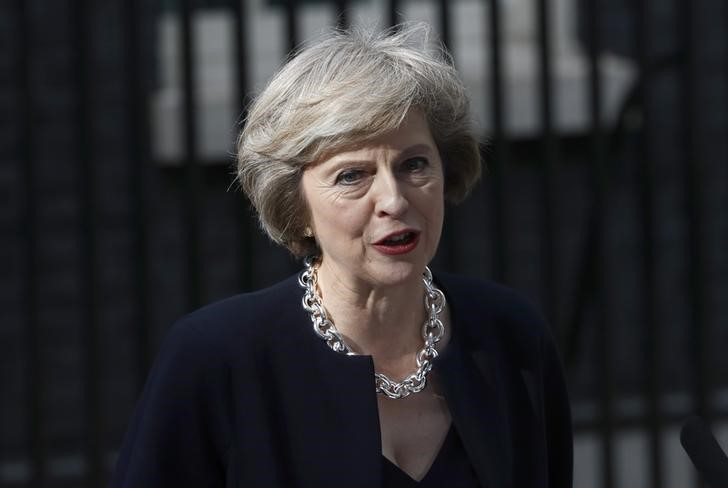By Russell Cheyne
EDINBURGH (Reuters) - British Prime Minister Theresa May heads to Edinburgh on Friday to discuss the implications of Brexit for Scotland with Nicola Sturgeon, head of the pro-independence Scottish government.
May's decision to visit Sturgeon on her own turf less than 48 hours after taking office underlines her determination to keep Scotland in the United Kingdom after the Brexit vote revived the issue of independence.
Scotland voted by 62-38 percent to stay in the European Union in the June 23 referendum while the United Kingdom as a whole voted 52-48 percent to leave the bloc.
Sturgeon says Scots must not be dragged out of the EU against their will and she will explore all options for preventing that from happening, including a second referendum on independence from the rest of the United Kingdom.
"I believe with all my heart in the United Kingdom – the precious bond between England, Scotland, Wales and Northern Ireland," May said in a statement.
"This visit to Scotland is my first as prime minister and I'm coming here to show my commitment to preserving this special union that has endured for centuries."
Sturgeon said it was her job to protect Scotland's interests.
"I respect how people in other parts of the UK voted. I hope the Prime Minister will respect how people in Scotland voted," she was quoted as saying in the Glasgow newspaper the Herald.
David Mundell, May's minister for Scotland, said there should be no second referendum on independence.
"I don't see any mood in Scotland to have a second independence referendum," he told BBC radio.
Scots rejected independence by 55-45 percent in a referendum in 2014, but since then, Sturgeon's Scottish National Party has gone from strength to strength, winning 56 of Scotland's 59 seats in the British parliament in the 2015 election.
Sturgeon said on Wednesday she wanted May to enable the Scottish government to explore options for Scotland to remain in the EU as a central part of the overall negotiations with the bloc over the terms of Britain's exit.
She has also repeatedly said that Scotland should be able to conduct talks directly with EU counterparts, and met several EU leaders in Brussels during a visit there days after the referendum.
She is unlikely to find May receptive to her arguments.
Britain's minister for Scotland said he believed the Scottish people did not want "the toxic and divisive" issue of a second independence referendum to be introduced to the process of leaving the EU.
"Of course there could be another independence referendum but the big issue is: should there be another independence referendum?" Mundell told BBC radio.
"I'm clear there shouldn't and will continue to passionately make the case for that and also for the benefit Scotland gets from the United Kingdom," Mundell said.
May's Conservative Party, unpopular in Scotland for decades, holds only one of those 59 seats, although it has recently improved its standing, coming second to the SNP in the Scottish parliamentary election in May.

It is now the official opposition to the SNP in Edinburgh, having beaten the once dominant Labour Party into third place.